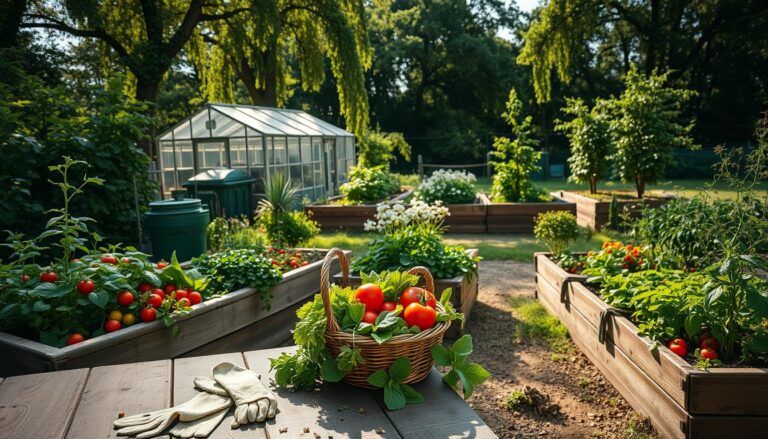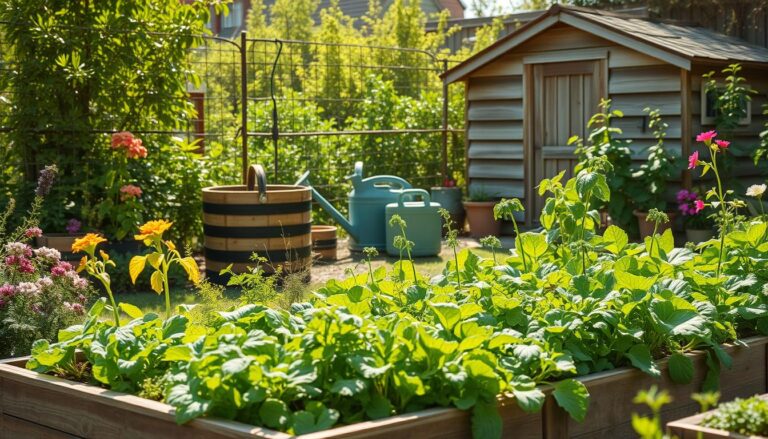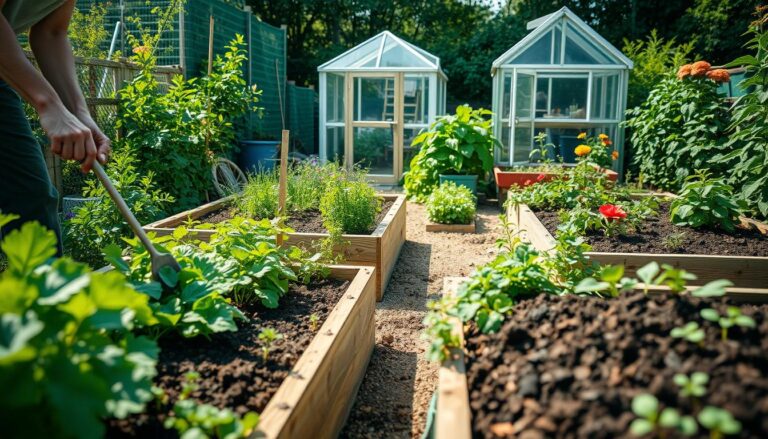Growing organic vegetables needs careful attention to the soil. The right organic gardening soil can change a poor harvest into a great one.
The quality of the soil affects your vegetable garden’s health and productivity. Knowing the best soil for organic vegetables helps create a perfect growing spot.
This means looking at nutrient content, drainage, and pH levels. These ensure your organic vegetables grow well.
The Science Behind Healthy Garden Soil
Understanding the science of healthy garden soil is key for a great organic vegetable harvest. The quality of your soil greatly impacts your garden’s health and productivity.
Soil is more than just a place for plants to grow. It’s a complex ecosystem full of microbial life. This ecosystem is crucial for breaking down organic matter, fixing nitrogen, and fighting plant diseases.
Why Soil Quality Determines Your Harvest Success
Soil quality is the base of successful organic gardening. Nutrient-rich soil for vegetables is vital for healthy plant growth and high yields. Poor soil can cause lower crop yields, more pests and diseases, and less nutritious vegetables.
- Soil structure affects root growth and water infiltration.
- Nutrient availability impacts plant health and productivity.
- Microbial activity influences nutrient cycling and disease suppression.
The Living Ecosystem Beneath Your Garden
The soil under your garden is full of life, from bacteria and fungi to insects and earthworms. This living ecosystem is essential for keeping soil healthy and fertile. Beneficial microorganisms in the soil help plants absorb nutrients better and grow healthier.
By understanding and caring for this ecosystem, gardeners can make their gardens more resilient and productive. This means using practices that boost soil organic matter, reduce soil disturbance, and encourage biodiversity.
What Is the Best Soil for Organic Vegetables?
Finding the right organic soil mix is key for growing healthy veggies. Good soil quality is vital for organic gardening. It’s important to know what makes soil fertile for veggies.
Key Characteristics of Fertile Organic Soil
Fertile organic soil is full of life and nutrients. It has a good structure and holds water well. It’s home to earthworms and microorganisms that help plants grow.
- High organic matter content
- Good water-holding capacity
- Aeration and drainage
- pH suitable for the plants being grown
The Ideal Soil Composition: Texture, Structure, and pH
The best soil for veggies has the right texture and structure. Loamy soils are perfect because they mix clay, silt, and sand well. The pH should be between 6.0 and 7.0 for most veggies.
Using natural soil amendments can help. Compost, manure, and green manure crops are great. They make soil healthier and support sustainable gardening.
How to Assess Your Current Soil Condition
Knowing your soil’s condition is key for a great organic garden. It helps you see what needs work. This way, you can make your soil better for plants.
Simple DIY Soil Tests You Can Perform Today
You don’t need fancy tools to check your soil. Simple tests can tell you a lot about it.
The Jar Test for Soil Composition
The jar test is easy to do. Just fill a jar with soil and water, shake it, and wait. The layers will show you the soil’s mix of sand, silt, and clay.
Testing Soil pH at Home
You can check your soil’s pH with a DIY kit or pH meter. This tells you if your soil is good for plants.
Evaluating Soil Life and Organic Matter
Look for earthworms and other life in your soil. It shows if it’s healthy. Also, check for plant material that’s breaking down.
Understanding Professional Soil Test Results
Professional tests give detailed info about your soil. They check nutrients, pH, and contaminants. Knowing this helps you choose the right compost for vegetable garden needs.
These tests also suggest the best nutrients for your veggies. This info is crucial for a rich topsoil for organic farming.
Essential Components of Nutrient-Rich Organic Soil
Understanding the key components of nutrient-rich soil for vegetables is crucial for organic gardening. This soil is full of life and gives plants what they need to grow well.
The Role of Organic Matter in Soil Health
Organic matter is vital for premium soil for growing vegetables. It makes the soil better, holds more water, and feeds beneficial microbes. Adding compost or manure boosts the soil’s organic matter.
Beneficial Microorganisms: The Invisible Workforce
Microorganisms like bacteria and fungi are key in breaking down organic matter. They make nutrients available to plants and fight diseases. It’s important to create a good environment for these microbes.
Mineral Content and Its Impact on Plant Growth
Minerals are essential for plant growth. They affect the health and productivity of your garden. Important minerals include nitrogen, phosphorus, potassium, and trace elements. A balanced mineral content is crucial for healthy plants and a good harvest.
Different Soil Types and Their Suitability for Vegetables
Soil type is key in organic vegetable gardening. It affects how well water drains, how nutrients are available, and how roots grow. The best soil balances these to create a perfect growing spot.
Clay, Sandy, and Loamy Soils: Pros and Cons
There are three main soil types: clay, sandy, and loamy. Each has its pros and cons for growing organic veggies.
- Clay soils hold moisture well but can be dense and hard to drain if not fixed.
- Sandy soils drain fast and warm up quickly in spring. They might need more water and food.
- Loamy soils are great for veggies. They drain well, hold water, and have lots of nutrients.
Working With Your Native Soil vs. Creating New Soil
Gardeners must choose between using their native soil or making a new mix. Working with native soil saves money and means improving the soil you have.
Creating a new soil mix lets you tailor it for veggies. It’s good for containers or raised beds.
Consider these points:
- The state of your native soil.
- The needs of the veggies you want to grow.
- The resources you have for soil work.
Natural Soil Amendments to Transform Your Garden
Turning your garden into a lush oasis begins with natural soil amendments. These are key for a fertile soil that helps your veggies grow strong and healthy.
Compost: The Gardener’s Gold
Compost is the gardener’s treasure. It adds nutrients, improves soil structure, and boosts beneficial microbes. It’s a natural way to make your soil richer.
How to Make Quality Compost at Home
To create great compost, mix green materials (like veggie scraps and grass clippings) with brown materials (like dried leaves and straw). Keep it balanced. Turn it often and keep it moist for the best compost.
Applying Compost Effectively
Spread compost by mixing it into the soil before planting or as a top layer on existing plants. It boosts soil health and feeds your veggies.
Organic Fertilizers and Their Benefits
Organic fertilizers, like fish emulsion, bone meal, and manure tea, feed plants without harming them. They encourage healthy growth and improve soil over time.
“The use of organic fertilizers is a cornerstone of sustainable gardening practices, as it enhances soil health and promotes biodiversity.”
Cover Crops and Green Manures
Cover crops and green manures are plants grown between crops. They protect and enrich the soil. They fight weeds, improve soil, and add nutrients, making them great for organic gardens.
| Type of Amendment | Benefits | Application Method |
|---|---|---|
| Compost | Improves soil structure, nutrient-rich | Mix into soil or top dressing |
| Organic Fertilizers | Provides essential nutrients | Apply according to product instructions |
| Cover Crops/Green Manures | Soil protection, weed suppression, nutrient addition | Plant between crop cycles |
Using these natural soil amendments can greatly enhance your organic vegetable garden’s health and yield.
Step-by-Step Guide to Creating Your Own Premium Soil Mix
Making your own premium soil mix is easy and boosts your garden’s health. Knowing what makes good soil helps you make the perfect mix for your plants. This ensures they get off to a great start.
You’ll need compost, peat moss or coconut coir, and perlite or vermiculite to start. These ingredients mix well to give your plants the right nutrients, keep water, and drain excess.
Basic Recipes for Container Gardens
For container gardens, mix 40% compost, 20% peat moss or coconut coir, 20% perlite or vermiculite, and 20% topsoil. This blend is perfect for nutrients and drainage.
Ideal Soil Mixes for Raised Beds
Raised beds need a mix that’s a bit heavier. Try 50% topsoil, 20% compost, 15% peat moss or coconut coir, and 15% perlite or vermiculite. It keeps moisture but drains well.
Customizing Soil Mixes for Specific Vegetables
Vegetables have their own soil likes. Here’s how to tailor your mix:
Root Vegetables
Carrots and beets like sandy loam with good drainage. Add more perlite or vermiculite for better drainage.
Leafy Greens
Lettuce and spinach do well in rich, organic matter. Increase compost for a nutrient boost.
Fruiting Plants
Tomatoes and peppers need a mix with more nutrients and a slightly higher pH. Add natural fertilizer for growth.
By following these tips, you can make a premium soil mix for your organic veggies. This leads to healthier plants and a bigger harvest.
Sustainable Soil Management Practices for Long-Term Success
For organic farming to thrive, it’s key to manage soil well. Keeping healthy soil for vegetables is vital for a good harvest. It needs a mix of methods to keep the soil alive.
Good soil management means knowing and using practices that boost soil health. Crop rotation and no-till gardening are two main ways to do this.
Implementing Effective Crop Rotation
Crop rotation is a key part of keeping topsoil for organic farming healthy. It helps gardeners:
- Reduce soil erosion
- Boost soil fertility
- Keep pests and diseases down
A good crop rotation plan can greatly improve soil health and garden output.
No-Till Gardening Methods for Soil Health
No-till gardening is also great for soil health. It:
- Reduces soil disturbance
- Keeps soil organic matter intact
- Encourages good microbes
Using no-till methods helps gardeners build a strong, lasting soil ecosystem.
Troubleshooting Common Soil Problems in Organic Gardens
The health of your organic garden depends a lot on the soil. You might face issues like pH imbalances, soil compaction, and nutrient deficiencies. These problems can really hurt plant growth and how well they produce.
Correcting pH Imbalances Naturally
Soil pH is key for nutrient use and microbes. To fix pH, use dolomitic limestone to raise it or elemental sulfur to lower it. Keeping an eye on pH is important to keep it just right.
Dealing with Compaction and Poor Drainage
Soil compaction and poor drainage harm roots. Adding organic matter like compost helps the soil. Cover crops and no-till farming also help avoid compaction.
Remediating Nutrient Deficiencies
To fix nutrient gaps, use natural soil amendments. Compost is great for many nutrients. Also, pick organic fertilizers that match the missing nutrients.
Here’s a quick guide to common soil problems and how to fix them naturally:
| Soil Problem | Natural Remedy | Benefits |
|---|---|---|
| pH Imbalance | Dolomitic limestone or elemental sulfur | Restores optimal pH for nutrient availability |
| Soil Compaction | Organic matter, cover crops, no-till methods | Improves soil structure, enhances drainage |
| Nutrient Deficiencies | Compost, organic fertilizers | Provides essential nutrients for plant growth |
Seasonal Soil Care Calendar for Year-Round Productivity
A well-planned seasonal soil care calendar is essential for a productive organic garden all year. By understanding and responding to your soil’s changing needs, you can keep it in the best condition for your vegetables to grow well.
Spring Soil Preparation Techniques
In spring, your soil needs to be ready for the new growing season. Begin by testing your soil pH and making any necessary adjustments. Add compost for vegetable garden to boost nutrient levels. For clay or sandy soils, mix in organic matter to enhance structure and fertility.
Here’s a simple checklist for spring soil preparation:
- Test soil pH and adjust
- Add compost or well-rotted manure
- Incorporate organic matter
Summer Soil Maintenance Strategies
In summer, keeping your soil healthy is key. Monitor soil moisture and mulch around plants to keep water in and weeds out. Keep adding organic gardening soil amendments as needed, based on soil test results.
Fall and Winter Soil Building Methods
In fall, focus on building soil organic matter by adding cover crops or green manures. For winter, plan to protect your soil with mulch or cover crops to stop erosion.
| Season | Soil Care Task | Benefits |
|---|---|---|
| Spring | Test and adjust pH, add compost | Optimal nutrient availability |
| Summer | Monitor moisture, mulch | Water retention, weed suppression |
| Fall/Winter | Incorporate cover crops, protect soil | Soil structure improvement, erosion prevention |
Conclusion: Cultivating Living Soil for Abundant Organic Harvests
Creating the best soil for organic veggies is key to a great harvest. Knowing the science behind healthy soil and checking your soil’s condition helps. This way, you can make your garden a perfect place for veggies to grow.
A healthy soil for veggies is full of good microbes, has the right texture, and lots of organic matter. Adding natural soil amendments and using sustainable practices can turn your garden into a lush oasis.
As you care for your soil, you’ll see it get better. This leads to more and better organic food from your garden. By using what you learned here, you can make a garden that’s good for you and the planet.
FAQ
What is the best soil for growing organic vegetables?
How can I improve the quality of my garden soil?
What are the key characteristics of fertile organic soil?
How often should I test my soil?
Can I create my own compost for my vegetable garden?
What are some common mistakes to avoid when preparing soil for organic vegetables?
How can I maintain healthy soil for vegetables over time?

Sortemdia nasceu com o propósito de trazer alegria e oportunidades para todos por meio de sorteios gratuitos de prêmios incríveis. O site tem como missão oferecer experiências acessíveis, divertidas e justas para quem deseja concorrer a produtos, serviços e brindes sem pagar nada por isso. Acreditamos que a sorte pode bater à porta de qualquer pessoa — e no Sortemdia, ela pode chegar com apenas um clique.



